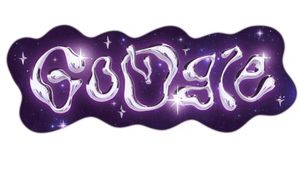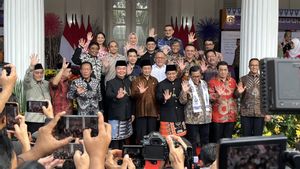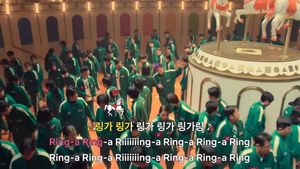Welcome back to VOI's signature Series. Especially for this edition, we will review about Ramadan. First, let's start from answering the things that are considered myths during this holy month for Muslims. Here it is, "All About Ramadan."
Every time entering the month of Ramadan, all Muslims on Earth carry out the third pillar of Islam: fasting. They not only endure hunger and thirst from dawn to sunset, but also have to control their passions, behave well, and worship as much as possible.
The amount of reward promised in the month of Ramadan is commensurate with the "challenges" which may be said to be tricky. What is considered breaking the fast is almost an annual discussion.
Therefore, many people are careful to do things that are feared to break their fast. Even though some of these worries could be a myth. For example, about what is the law of brushing your teeth when fasting. How is the law?
Brush your teeth when fasting
Not a few people worry that brushing their teeth during fasting will be invalidated. However, according to the explanation of Muhammad Anis Sumaji and Najmuddin Zuhdi in the 125 Problems of Fasting, using siwak or the like such as a toothbrush with toothpaste, is permissible while fasting.
This is because brushing your teeth using toothpaste or not is limited to putting something in your mouth but then removing it again. Therefore, brushing your teeth is not considered to invalidate fasting.
Likewise, NU Online also argues that those who brush their teeth using toothpaste, if no water or paste enters their throat, their fasting is not canceled. Fasting will be canceled if there is water or paste swallowed, even if accidentally, the fast is canceled.
Therefore, for the sake of caution, you should brush your teeth before the time of ruling arrives. When it is noon, just brush your teeth with siwak wood or with a toothbrush without using paste.
Eat a lot at dawnBecause they have to fast for 12 hours, many people think that the more food they eat at dawn, the stronger they will fast. Unfortunately that view is imprecise.
Instead of consuming a lot of food, at dawn it is better to pay attention to the composition and nutrients that will be consumed. The British Nutrition Foundation explains, drinking more water and choosing foods rich in fluids at dawn can be an option.

In addition, choose starchy foods to strengthen energy. Then choose types high in fiber or whole grains if possible as these can help a person feel full and can aid digestion by preventing constipation.
What is no less important is if you eat savory dishes at dawn, it is better to reduce foods that contain a lot of salt, aka too salty. Because, salt will bind water. As a result, thirst will get over the body more quickly when fasting.
Prohibition of fasting for breastfeeding mothersThis is also one of the questions that often arise during Ramadan. So what are the facts?
Breastfeeding mothers are indeed given the leeway not to fast, but that does not mean that they are prohibited from fasting. Many people think that when fasting, milk production is small and the nutrients contained are reduced. Yet research shows otherwise.
The journal entitled Impact of Maternal Ramadan Fasting on Growth Parameters in Exclusively Breast-fed Infants Iran presents research related to the effect of maternal fasting during Ramadan on the growth of exclusively breastfed babies aged 15 days - 6 months. The mother of 36 babies fasted during Ramadan and 80 mothers did not fast. The baby's growth was evaluated twice during Ramadan, 3 times in the second month and bi-monthly for the following 4 months.
This study found no significant difference in infant growth in the two groups. This study concluded that Ramadan fasting by breastfeeding mothers does not adversely affect the growth of infants who are exclusively breastfed at least in the short term.
The same thing was also revealed by the journal Impact of Maternal Fasting During Ramadan on Growth Parameters of Exclusively Breastfed Infants in Shahroud. In the journal, researchers studied the growth of 55 healthy babies who were exclusively breastfed during the ages of 1-6 months.
Of the 55 babies, 20 mothers fasted during Ramadan and 35 mothers did not fast. Infant growth was evaluated twice during Ramadan and four times in the first, second and third months after Ramadan. This study concluded that fasting in Ramadan by nursing mothers did not adversely affect the growth of breastfed babies at least in the short term.
If a mother does not drink fluids for a day, her baby will generally breastfeed as usual on fasting days, but will breastfeed more frequently the next day or two.
Crying cancels the fastMaybe some people have had the experience of crying being reprimanded for fasting. Those who reprimand say that crying breaks the fast. But is that true?
Ustadz M. Ali Zainal Abidin, through his writing entitled Can Crying Break Fasting? explained, in various books described in detail about various things that can cancel fasting. Crying is not one of the causes of breaking fasts. He gave an example in the book of Matnu Abi Syuja ':
"There are ten things that invalidate fasting, namely (1) something that reaches the inner cavity of the body (jauf) or the head, (2) treating by putting something in one of two ways (qubul and rectum), (3) vomiting regularly. intentionally, (4) having deliberate sexual intercourse on the genitals, (5) discharge of semen due to skin contact, (6) menstruation, (7) postpartum, (8) insane, (9) fainting throughout the day and (10) apostasy , "
The eye does not have a channel that leads objects to the throat, so it is impossible when someone cries, something enters the eye into the throat. It is different if the tears are swallowed and passed through the throat, then the fast will be invalidated.

Maybe some people worry about feeling thirsty or tired if they keep exercising while fasting. Some are even afraid of fainting and making them break their fast. Quoting Global News, an Ontario-based nutritionist, Anar Allidina, said it is important for Muslims to provide time to exercise even though they are fasting.
If a busy schedule doesn't allow him, he suggests exercising about an hour after dawn. At that time, the person who breaks the meal will digest some of the food and have more energy. Allidina said the worst time to exercise is in the middle of the day, because those who fast will be exhausted and unable to refuel.
However, if that's their only free time, he suggests exercising for only 20 to 30 minutes, and doing low-intensity exercise. Allidina recommends starting slowly with exercise during the first few days of Ramadan by only exercising for half an hour if possible.
The English, Chinese, Japanese, Arabic, and French versions are automatically generated by the AI. So there may still be inaccuracies in translating, please always see Indonesian as our main language. (system supported by DigitalSiber.id)













